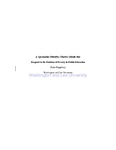| dc.rights.license | In Copyright | en_US |
| dc.creator | Kingsbury, Katie | |
| dc.date.accessioned | 2013-12-17T17:32:43Z | |
| dc.date.available | 2013-12-17T17:32:43Z | |
| dc.date.created | 2007 | |
| dc.identifier | WLURG38_Kingsbury_POV_2007_wm | |
| dc.identifier.uri | http://hdl.handle.net/11021/26007 | |
| dc.description | Katie Kingsbury is a member of the Class of 2007 of Washington and Lee University. | en_US |
| dc.description | Capstone; [FULL-TEXT FREELY AVAILABLE ONLINE] | en_US |
| dc.description.abstract | There are two important questions to keep in mind throughout this paper. The first of these is how "success" ought to be defined. Is it college entrance and graduation? Is it a certain type or level of occupation; that is, can a car mechanic succeed as well as a managerial accountant? Is it the acquisition of social skills? Approaching the issue from the opposite side of the spectrum, is it the absence of behavioral or emotional problems? Is it escape from an impoverished or high-crime neighborhood? It is important to determine what educational success means today, because this definition inherently guides the content, structuring, and measurement of public education reform measures.
The second question to keep in mind is whether the nontraditional methods that help disadvantaged students succeed in charter schools can and should be transferred to public schools in general. Is this even a goal of the charter school movement? Are there hidden costs in such a transfer that would counterbalance the gains to be made in traditional public schools? [From introductory section] | en_US |
| dc.description.statementofresponsibility | Katie Kingsbury | |
| dc.format.extent | 35 pages | en_US |
| dc.language.iso | en_US | en_US |
| dc.rights | This material is made available for use in research, teaching, and private study, pursuant to U.S. Copyright law. The user assumes full responsibility for any use of the materials, including but not limited to, infringement of copyright and publication rights of reproduced materials. Any materials used should be fully credited with the source. | en_US |
| dc.rights.uri | http://rightsstatements.org/vocab/InC/1.0/ | en_US |
| dc.subject.other | Washington and Lee University, Shepherd Poverty Program | en_US |
| dc.title | A Spectacular Minority: Charter Schools that Respond to the Problem of Poverty in Public Education | en_US |
| dc.type | Text | en_US |
| dcterms.isPartOf | RG38 - Student Papers | |
| dc.rights.holder | Kingsbury, Katie | |
| dc.subject.fast | Education | en_US |
| dc.subject.fast | Educational evaluation | en_US |
| dc.subject.fast | Poverty | en_US |
| dc.subject.fast | Race discrimination | en_US |
| dc.subject.fast | Charter schools | en_US |
| dc.subject.fast | No Child Left Behind Act of 2001 (United States) | en_US |
| dc.subject.fast | Magnet schools | en_US |
| dc.subject.fast | KIPP | en_US |
| local.department | Shepherd Poverty Program | en_US |
| local.scholarshiptype | Capstone | en_US |
